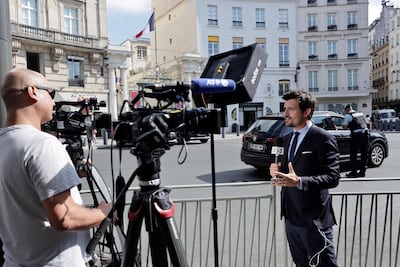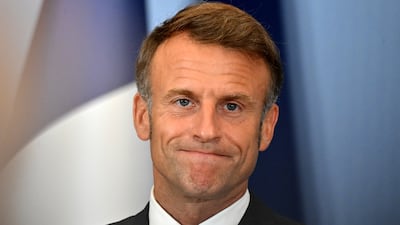Pressure increased on Monday on President Emmanuel Macron to nominate a prime minister, as schools re-opened after the summer holidays yet a caretaker government continued to administer the country's affairs due to political bickering.
There was hope an announcement would be made after former Socialist Party prime minister Bernard Cazeneuve appeared to be a favourite, but no information was shared after he met Mr Macron for more than an hour.
The President is also scheduled to hold meetings with another favourite, former right-wing labour minister Xavier Bertrand, as well as Mr Macron's predecessors Francois Hollande and Nicolas Sarkozy.
Reporters standing outside the Elysee Palace were left wondering if Mr Cazeneuve's name would be set aside as the Elysee started to circulate the yet-unheard possibility of Thierry Beaudet, a civil society figure unknown to the public.
A new round of consultations has been announced for later in the afternoon.
"Maybe this is just another communication operation by Macron, who will then say that no agreement could be found," reported BFMTV.

Mr Macron has been described by Le Monde as "playing with the nerves" of Mr Cazeneuve, whose entourage told the press that he was "available to serve the country".
France has never known a longer time period without a permanent government since the establishment of the Fifth Republic in 1958. Gabriel Attal resigned as prime minister on July 16 following a heavy defeat of the president's camp in a snap election. "Our country is going through an unprecedented political situation," Mr Attal said on Monday.
A left-wing coalition, which came first in the election, suggested on July 23 the name of Lucie Castets, who heads the finance department of the city of Paris. She was rejected by Mr Macron who said a left-wing government would be a "threat to institutional stability".
A cabinet led by Ms Castets is expected to be immediately toppled by the centre, the right and the far-right, who said they were against the left-wing coalition's electoral programme which included increasing the minimum monthly wage to €1600 ($1771) a month.
For the first time, there are three roughly equal forces – the left, the centre and the far-right – in Parliament, forcing politicians into uneasy coalition talks in a country with no history of coalitions.
The left-wing coalition has rejected the name of Mr Cazeneuve. He left the Socialist Party in 2022 and is sharply critical of far-left political party France Unbowed, which has the biggest number of MPs within the coalition.
"We will censor any form of continuity with Macronism," said Socialist Party leader Olivier Faure on Monday.
France Unbowed politicians have accused Mr Macron of wanting to impose his own agenda. "He wants a coalition with himself," said European Parliament member Manon Aubry on Monday.
Supporters of Mr Macron have rejected such accusations and say that he views himself as an arbitrator keen on finding the right candidate who would ensure stability, but also not destroy key policies that were implemented during his mandate – including a controversial pension reform.


